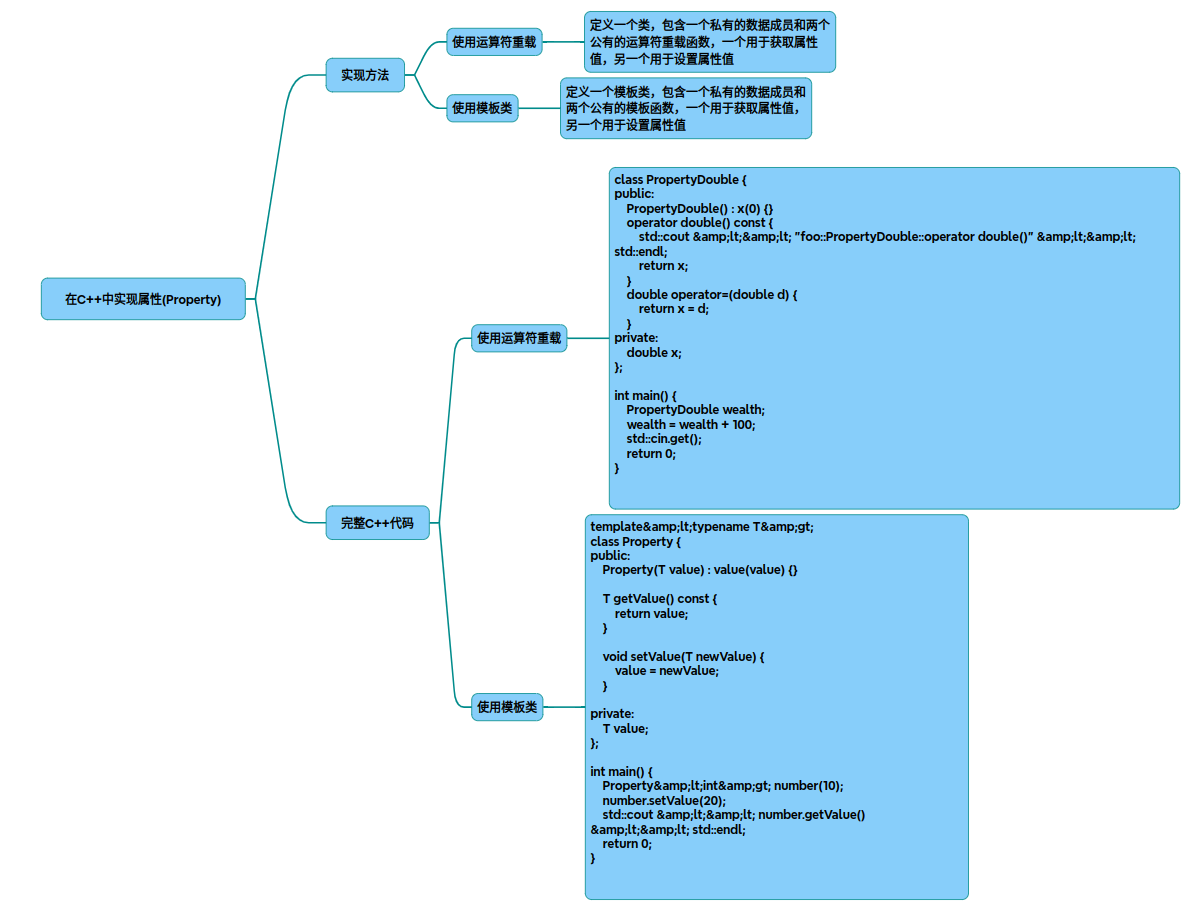Property在C++中的实现与应用

以下是在C++中实现属性(Property)的完整实现方案,结合模板技术和运算符重载实现类型安全的属性访问,支持独立模块化封装:
#include <iostream>
#include <functional>
template<typename HostType, typename ValueType>
class Property {
using Getter = ValueType (HostType::*)() const;
using Setter = void (HostType::*)(const ValueType&);
HostType* host;
Getter getter;
Setter setter;
public:
Property(HostType* h, Getter g, Setter s = nullptr)
: host(h), getter(g), setter(s) {}
// 读取属性值运算符重载
operator ValueType() const {
if (!getter) throw std::logic_error("Getter not defined");
return (host->*getter)();
}
// 赋值运算符重载
ValueType operator=(const ValueType& value) {
if (!setter) throw std::logic_error("Setter not defined");
(host->*setter)(value);
return value;
}
// 只读属性特化
class ReadOnly {
Getter getter;
const HostType* host;
public:
ReadOnly(const HostType* h, Getter g) : host(h), getter(g) {}
operator ValueType() const { return (host->*getter)(); }
};
// 重载 << 运算符
friend std::ostream& operator<<(std::ostream& os, const Property& prop) {
os << static_cast<ValueType>(prop);
return os;
}
// 重载 << 运算符(只读属性)
friend std::ostream& operator<<(std::ostream& os, const ReadOnly& prop) {
os << static_cast<ValueType>(prop);
return os;
}
};
#include "Property.h"
/* 使用示例 */
class User {
std::string name_;
int age_;
// 私有访问方法
std::string get_name() const { return name_; }
void set_name(const std::string& val) { name_ = val; }
int get_age() const { return age_; }
public:
// 公开属性定义
Property<User, std::string> Name{
this,
&User::get_name,
&User::set_name
};
Property<User, int>::ReadOnly Age{
this,
&User::get_age
};
User(const std::string& name, int age)
: name_(name), age_(age) {}
};
int main() {
User user("zhengtianzuo", 18);
// 属性赋值
user.Name = "zhengtianzuo";
// 属性读取
std::cout << "Name: " << user.Name << std::endl;
std::cout << "Age: " << user.Age << std::endl;
// user.Age = 20; // 编译错误(只读属性)
return 0;
}
实现原理分析
- 模板类设计: Property模板类封装宿主对象指针、getter/setter方法指针 通过HostType模板参数实现与宿主类的解耦 使用嵌套类ReadOnly实现只读属性特化
- 运算符重载: operator ValueType()实现属性值的隐式转换(读取操作) operator=重载实现属性赋值操作 通过函数指针调用实际存取方法
- 类型安全检查: getter/setter必须匹配宿主类和值类型 只读属性禁用赋值运算符(编译期检查)
关键特性
- 访问控制: 通过setter存在性判断实现读写/只读控制 支持自定义存取逻辑(如数据校验)
- 性能优化: 零运行时开销(编译期绑定) 不依赖虚函数或动态类型检查
- 模块独立性: 属性实现与业务逻辑完全解耦 可复用至任意需要属性特征的类
扩展应用场景
// 数据校验示例
class Temperature {
double celsius_;
double get_c() const { return celsius_; }
void set_c(double val) {
if(val < -273.15) throw std::range_error("Below absolute zero");
celsius_ = val;
}
public:
Property<Temperature, double> Celsius{this, &Temperature::get_c, &Temperature::set_c};
};
// 派生类支持
class Animal {
protected:
virtual std::string sound() const = 0;
};
class Dog : public Animal {
std::string sound() const override { return "Woof"; }
public:
Property<Dog, std::string> Sound{this, &Dog::sound};
};
该实现方案完整实现了C++中的属性特征,通过模板技术和运算符重载提供了类型安全、高性能的属性访问机制,可作为独立模块集成到各类项目中。